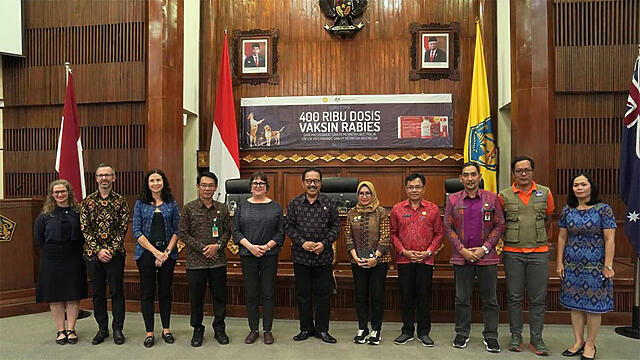Supporting our near northern neighbours to achieve rabies “Zero by 30”
Preventing and controlling emergency animal diseases such as foot-and-mouth disease, lumpy skin disease, and dog-mediated rabies requires collaborative efforts. Australia has been strengthening pre-border biosecurity efforts to control dog-mediated rabies through assistance to our near northern neighbours including Indonesia and Timor-Leste.
Dog-mediated rabies is a serious zoonoses and public health risk, responsible for 59,000 human deaths globally each year. Australia and Timor-Leste are free from dog-mediated rabies. However, it is present in parts of Indonesia, such as Bali and more recently West Timor. The Office of the Chief Veterinary Officer have been working closely with Australian government counterparts and Indonesia’s Ministry of Agriculture to coordinate assistance efforts to control dog-mediated rabies to achieve “Zero by 30” – the collective goal of the World Health Organisation, the Food and Agriculture Organisation of the United Nations and the World Organisation for Animal Health (WOAH) to end human deaths from dog-mediated rabies by 2030.
Mass vaccination of dogs is the most cost-effective and practical way of reducing the impact of human rabies as dog vaccination limits virus transmission from animal bites. The department has partnered with WOAH and Indonesian authorities to deliver a four-year control program in Bali, Indonesia. 200,000 doses of vaccine were provided from the WOAH rabies vaccine bank in September 2022, and again in July 2023. A further 200,000 doses is scheduled for 2024.
Vaccinations form only part of Australia’s rabies prevention and control support for our region. Preventing the spread of rabies to Timor-Leste is a priority. We are working closely with our partners in the Timor-Leste Ministry of Agriculture and Fisheries (MAF) to enhance community awareness about rabies and actions to take if people are bitten by dogs. Many dogs in Timor-Leste are free roaming, so handling dogs in a disease response or vaccination campaign presents a challenge. In September, the Chief Veterinary Office’s international capacity building team will work with an international dog behaviour expert to facilitate training for MAF’s animal health officers in dog handling and vaccinations, so that any future rabies response or vaccination activities can be conducted as safely as possible. We are also supporting MAF to build capability in rabies diagnostic testing in collaboration with the Australian Centre for Disease Preparedness. Rabies awareness training for quarantine officers was delivered in July at the Biosecurity Training Centre – a collaboration between the department and Charles Sturt University.
View Original | AusPol.co Disclaimer
